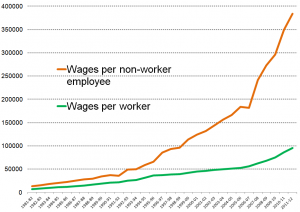Does pure capitalism exist?
The way the argument started indeed seems appealing. I am sure the story about Rohit Rohan and Raj strikes a chord with the readers. But does it come close to reality? Can Socialnagar, Communagar and Capitalnagar, exist in their pure forms? Or for our context, can there be a state which is purely capitalistic? Quoting Prof Richard D Wolff “Pure Capitalism is pure fantasy”. Think if the activities of the free market in Capitalnagar stays fully unregulated, then one day, the economic power will get concentrated in the hands of a few and they will be powerful enough to control the Government, this being the sole reason why the Government in every capitalistic economy binds the markets by some regulations and laws.
Similarly if Socialnagar were purely socialistic, then it will concentrate all power in the hands of the Government and promote red-tapism and corruption. And the result will be all the same, power concentration in the hands of a few. A few examples of this could be former USSR and Cuba.
So deciding capitalism to be the best alternative, on the basis of just its merits and on the basis of demerits of other models seems an outright bias. The facts that Capitalism concentrates power, creates monopoly, leads to the exploitation of workers who are underpaid even though they innovate and give their best has been let aside to portray capitalism in positive light. One might argue that the entrepreneurs and businessmen are the brainchild of this model, but how many self-made businessmen do we find? Nepotism and crony capitalism often gives way to concentration of power amongst undeserving people. Social benefits of the people are grossly ignored and economic disparities arise.
One might also agree that if a person is hard working, innovative and deserving, then the concentration of wealth makes sense. Fair enough. But just consider a millionaire who acquires another million, makes little difference to him, going by the “law of diminishing marginal utility of wealth” while that wealth could have been used for the bigger societal cause in education and healthcare. Let me clarify the fact that I do not mean to argue that a socialist or a communist model is the way to follow, but my point is capitalist model in its pure form definitely is not the most viable alternative.
“Capitalism is a system that has co-evolved with humans to be the system that best fits our psychology and also best takes advantage of evolutionary dynamics”
Agreed, that capitalism has co-evolved with humans. It has taken cues from the evolutionary dynamics, where we could say that it emphasizes on survival of the fittest. But is that strategy sustainable in the long term? The society is comprised of a number of people who are deprived of basic amenities at birth. It makes them bereft of a level playing field from the very beginning. No doubt, some of those exceptional ones still defy the odds to emerge out strongly as winners, but how many? We can’t justify a theory on the basis of exceptions. Moreover, the proposition that capitalism best fits our psychology is largely debatable, unless established.
“Humans inherently have a tendency to want more, want better than someone else for themselves and capitalism empowers them to do that. It provides people good incentives to work hard, think out of the box and come up with ideas that help improve the individual and in turn the society. The profit motive under capitalism that is often criticized as “greed” is in fact, the driving force behind ideas that make processes and society more efficient”
I completely agree to the fact that wants act as incentives for our work. But how often are the wants related to work? And what is the real incentive? Money, wealth and profits, isn’t it? And don’t the inner craze to amass wealth often lead to greed? One can invariably find several examples of misappropriation in the private sector (even in India) . Isn’t the criticism and concern genuine? The answer is pretty obvious.
“Capitalism has improved the material standards of living of the societies implementing it”
Has it really? Of course, it has increased income levels, but at the same time, the products and services have become costlier too which has nulled out the effect. While the fact that it has improved technology and products is undeniable, it has definitely increased the disparities between different classes to unacceptable levels.
[caption id="attachment_45786" align="aligncenter" width="300"] India: Economic Disparities surged after liberalization[/caption]
India: Economic Disparities surged after liberalization[/caption]
“It has encouraged continued technological innovation to ensure that these resources are used in the most efficient way and more and more substitutes have been found to replace them”
Many of our natural resources like coal, petroleum etc are exhaustible. But the capitalistic attitude has led to haphazard and unrestrained use of these depleting resources. Also, the activities of the capitalists causes a lot of harm to the environment. No doubt, technologies has been coming up to reduce the harm caused, but there is hardly any attempt to move towards sustainability as profitability is the sole motive, but at what cost? The cost of endangering the world’s existence in future? A burning example of this is vindicated by the adamant behavior of developed capitalist economies like USA in several environment conventions.
”In the end, capitalism is the only viable system we have for organizing our economy. It alone is compatible with political and democratic freedoms.”
Democracy means much more than the process of free and fair elections. It is a system for accomplishing what can only be achieved by citizens joining together to further the common good. But though free markets have brought unprecedented prosperity to many, they have been accompanied by widening inequalities of income and wealth, heightened job insecurity, and environmental hazards. Democracy is designed to allow citizens to address these very issues in constructive ways. And yet a sense of political powerlessness is on the rise among citizens in Europe, Japan, and the United States, even as consumers and investors feel more empowered. In short, no democratic nation is effectively coping with capitalism's negative side effects.
In the end, the crux of the issue is not to prove that capitalism is the worst choice. It is to clarify that there indeed are other choices of “balanced” mixed economy and progressive models which are are/would serve as a better approach. Economic disparities would still remain, but the levels could vastly reduce. Capitalistic economy may have its own advantages, but considering it the “ONLY” best option is a myth, which can never be established.
Ansuman Mishra
Akshya Kattuputhur Murali
Team Name: The Rebels
XLRI Jamshedpur
Read the original argument by IIM Lucknow here.

